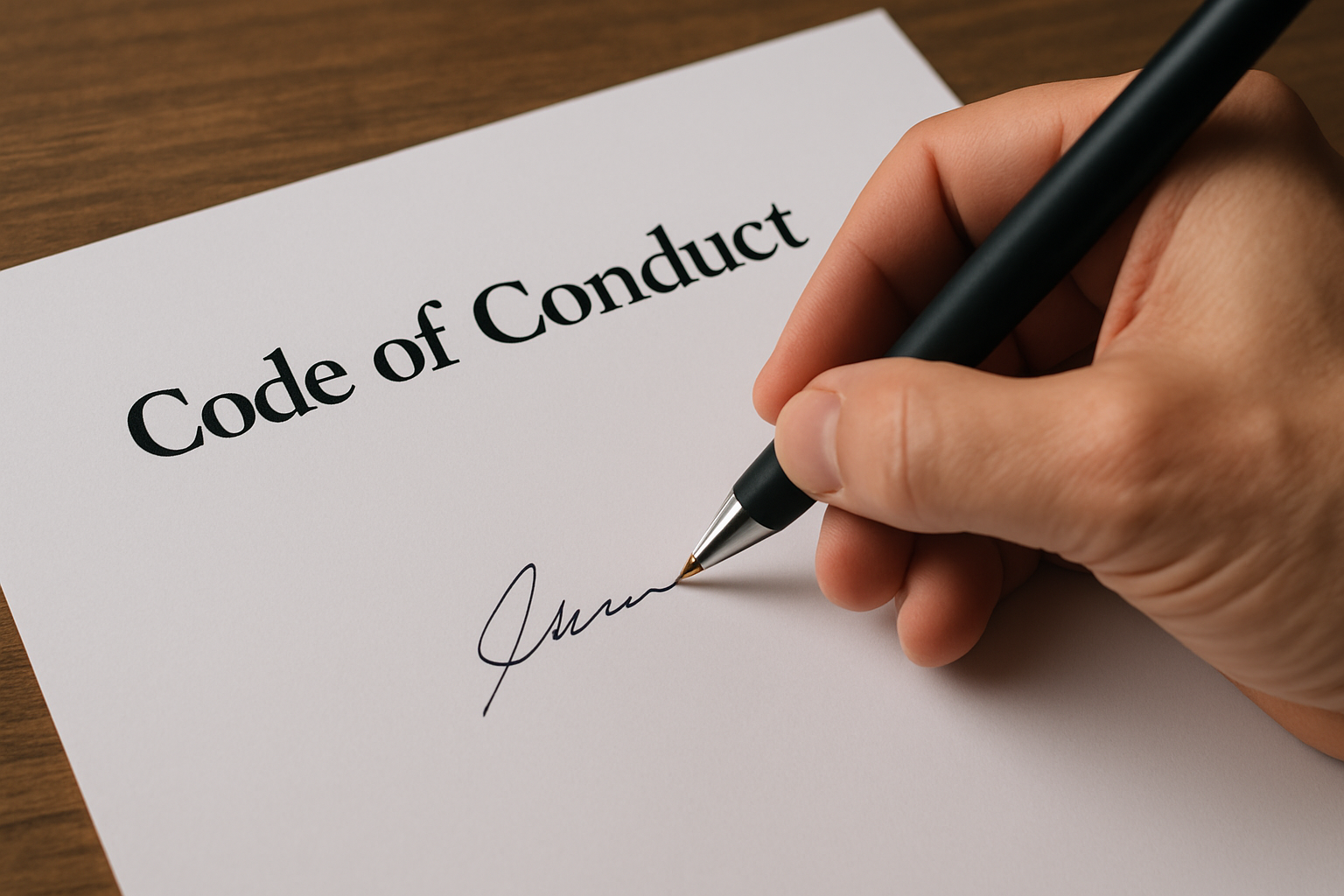Most forums waste hours trying to write the perfect constitution from scratch, only to end up arguing over commas and calendar dates.
Over the years, I’ve watched groups gather with good intentions to write a Forum Code of Conduct. They sit down with a blank Google Doc, excited to “craft something meaningful.” Fast forward 20 minutes, and they’re locked in debate over what to name the group, whether dinners should be mandatory, or what happens if someone misses two meetings.
The problem? They’re designing guardrails while trying to drive the car. It slows the group down and drains the momentum. That’s why I always tell forums:
Don’t start from scratch. Start from structure.
Your Forum Code of Conduct isn’t about legal perfection, it’s about shared expectations and smooth operations. Use a template, discuss what matters most, and focus on progress over perfection.
Instead of building your code from the ground up, use my battle-tested template, refined from hundreds of successful groups. Here’s how to make it your own, section by section:
1. Start With the Template
Don’t reinvent the wheel. This template includes common best practices and pre-filled defaults that work for most groups. Use the yellow-highlighted sections as your cue to pause and discuss, those are the areas meant for customization.
2. Prep Before You Meet
Have everyone read and review the document before your meeting. No one should be seeing it for the first time when you gather. This saves time and keeps your meeting focused.
3. Dedicate a Full Meeting
Expect this process to take at least 60 minutes, often more. It’s best to replace your regular Deep Dive with this discussion.
4. Progress Over Perfection
Your goal isn’t to lock in a flawless document, it’s to agree on a good enough starting point. If something isn’t quite right, trust that your group will revisit and revise it later. In fact, the constitution includes a clear process for making updates.
5. Expect Pushback (Especially from Lawyers)
Some members, especially those with legal backgrounds, may push for perfection. Remind the group: this isn’t a binding legal document. It’s a shared playbook. Progress is the priority.
Section-by-Section Tips:
Here are quick insights for navigating some of the more nuanced parts of the template:
Group Name – Don’t force it. I usually assign a placeholder name when launching a group—something fun or thematic. The real name tends to emerge later, after shared experiences shape the group’s identity. Forcing it upfront leads to names that feel hollow. Let it evolve.
Forum Purpose & Values – Use the defaults, for now. These aren’t just filler; they’re based on what’s worked for dozens of successful groups. Most teams don’t have the clarity or cohesion in the early days to craft deep purpose or values. Save that work for your annual retreat, when trust is high and people are ready to go deeper.
Meeting Logistics – Set a recurring monthly date and time. Predictability creates rhythm. A rotating schedule leads to burnout and missed meetings. One person should own rescheduling (if needed), but if no consensus can be reached, the original date stands. That clarity reduces drama.
Dinners – Make them mandatory. Why? Because the best conversations often happen after the meeting. I call it the “boardroom vs. the bar” dynamic, the formal stuff happens in the meeting, but the bonding happens at the dinner table.
Virtual Attendance Policy – Pick a lane: all in-person or all virtual. Hybrid sounds inclusive, but it rarely works. In-person members bond deeply while virtual ones feel like outsiders. You’ll always get a “two-tier” culture. Make a clear choice, and stick to it.
Full Retreats – Minimum 48 hours. Two overnights. Time away from your normal environment is critical to reset, connect, and go deeper. Don’t underestimate the power of shared meals, fireside chats, and spontaneous moments. Whether it’s a $10,000 week abroad or a weekend at someone’s lake house, the magic comes from time and intention, not cost.
Pay up front – Retreats are the #1 drop-off point for new members. Asking for payment 30 days in advance increases commitment and reduces last-minute flakes that leave you stuck with costs.
Fines & Misses – 2.5 misses is the sweet spot. It balances accountability with flexibility. And the “cooling off” period after removal helps ensure decisions aren’t emotional. In my experience, people rarely return after they leave—and that’s okay. They self-select out of the commitment.
Buzz = fine – Whether it’s a text ding or a phone ring, it breaks the sacred space of the meeting. Fines ($20 is standard) aren’t about punishment, they’re about protecting focus.
Forum Financials – Choose a system, upfront or split-as-you-go. A quarterly pool simplifies payments, but it can create awkwardness if someone misses a dinner. Splitting live keeps it fair, but takes time. Neither is perfect, just pick what suits your group’s personality.
Discuss alcohol – Yes, really. It’s the number one variable in skyrocketing dinner bills, and can cause tension if not addressed. Some people love fine wine; others don’t drink at all. Decide together what’s fair.
Member Evaluation – Make it annual. Just like a business does performance reviews, forums should too. This isn’t about judgment, it’s about alignment, accountability, and giving people a chance to course-correct.
Code of Conduct Updates – 2/3 vote at the retreat. Unanimous vote mid-year. This ensures you don’t rewrite the rules impulsively. Annual reviews keep it fresh, while the unanimous rule protects against emotional flip-flops during the year.
FMLA Leave Policy – This is essential. Life happens, health issues, caregiving, burnout. Having a clear leave policy ensures people can step away and come back without guilt or penalties. It also helps the group plan accordingly.
New and Departing Members – Unanimous vote in, ideally one-month notice out. This protects group trust. And forfeiting pre-paid fees? It’s less about money, more about honoring the group’s shared commitment.
Business & Romantic Relationships – Protect the Forum space. Business and romantic entanglements often lead to guarded sharing, power dynamics, or fallout. Some casual exchanges (like dining at a member’s restaurant) are fine, but anything beyond a set threshold (say, $500) should be discussed with the group.
Conflict Resolution – Default to structure, not emotion. If a situation isn’t covered in the Code, use a 2/3 vote excluding the person in question. If tied, the moderator decides. This gives you clarity when things get messy.
Forum Size – 6–10 members is the ideal range. Fewer than six and it’s too shallow. More than ten and it’s hard to get meaningful airtime. Unless your meetings are longer, I advise staying under ten.
Forum Pillars (Experience-Sharing, Confidentiality, etc.) – These are your sacred values. Emphasize that members speak from experience, carry their own “handbags,” and protect the room. Especially for confidentiality: one violation should trigger an automatic group conversation and unanimous vote to keep the member. The group needs to feel safe, period.
Whew, that’s a lot, but it’s worth every second and will save you lots of hours and frustration in the future. Don’t let your Forum drift without a compass. Start with my proven template, schedule a full meeting to review it, and focus on progress over perfection. The strength of your group depends on the strength of your agreements.

